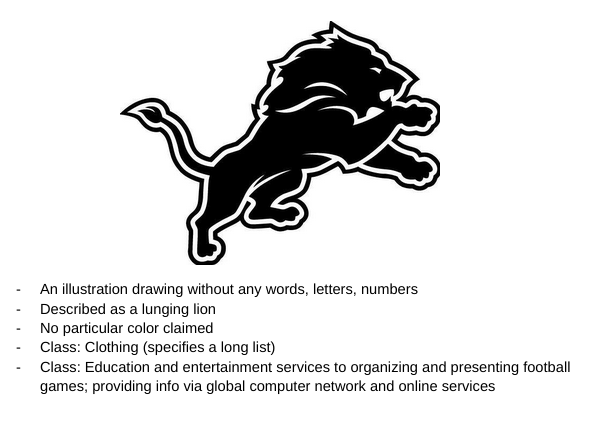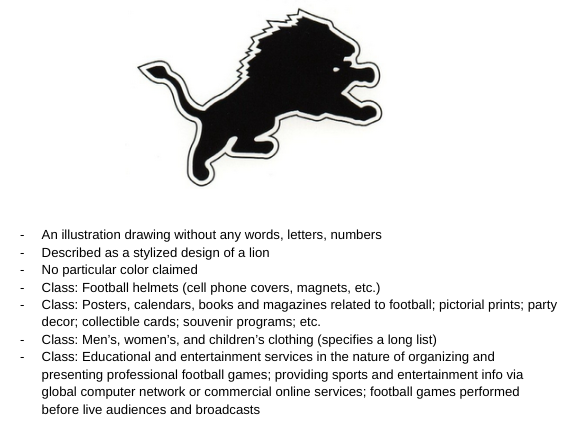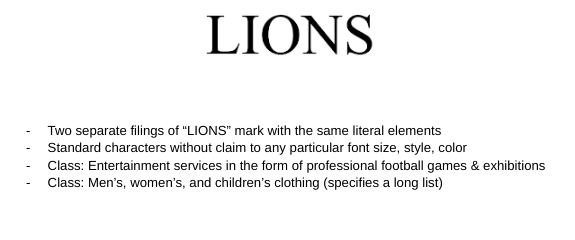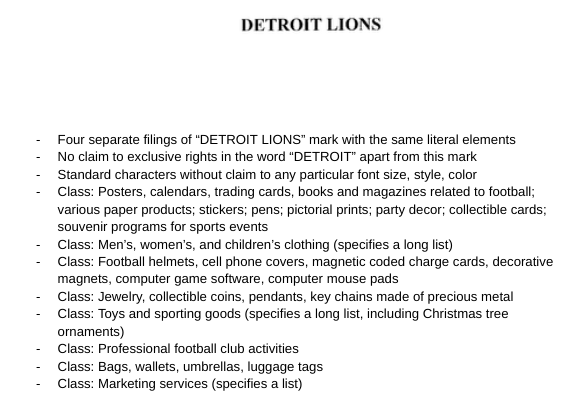Understanding Counterfeit Merchandise in Sports
Upon seeing a news story about Detroit police seizing at least $85,000 worth of counterfeit Detroit Lions merchandise over the course of the 2023 NFL season, I realized it might be worth while to explain what counterfeiting and counterfeit marks are for a few different reasons: (1) You confidently know the merchandise’s source; (2) You may be able to better gauge the merchandise’s quality; and (3) You can support the businesses that do it right!
Note: I am not against screenprinters trying to make a buck, nor am I endorsing nitpicking by conglomerate organizations (which they have the right to do and could potentially lose that right should they not police their marks’ uses). I am, on the other hand, all about supporting those who take a moment to learn what is considered legal and what crosses that line.
® provides notice to the public that your trademark or service mark is registered in a particular country for the goods or services under that mark. This symbol can only be used after your mark is registered.
™ provides notice to the public that you are selling goods or services under the particular mark and are considering claiming your rights. This symbol can be used before, during, or without registration.
What the law says
The primary federal law governing trademarks in the United States called the Lanham Act states that a “counterfeit mark” is a “spurious mark which is identical with, or substantially indistinguishable from, a registered mark.” There are slight differences when it comes to civil and criminal definitions, too, but both understand that determining what is “substantially indistinguishable” needs to be done on a case-by-case basis to see how much modification crosses the line into trademark infringement even if the mark is not absolutely identical. In general, the key to determining whether someone’s use of a mark is classified as counterfeiting is whether the use of a mark is likely “to cause confusion, to cause mistake, or to deceive.” It’s kind of like forging a signature - when you forge a signature, you are producing a copy or an imitation with the purpose of deceiving. So, there are two pieces to counterfeiting: (1) the use itself, and (2) intent to confuse or deceive or knowing that it will likely confuse or deceive.
Notably, this law only applies to “registered marks,” i.e., marks registered with the United States Patent and Trademark Office (USPTO). It does not apply for unregistered marks! Logos, phrases, and images with words are all trademark-worthy subject matter. Inversely, a party can only register a color for trademark protection if the public has come to associate that color with that particular brand because that party has used that color in connection with a good or service over time. For example, the University of Michigan asserts that there is a signature primary palette of Maize and Blue that identifies its brand, but these colors alone do not fall under trademark law’s protection. However, Maize and Blue were used to identify the University as the source of the goods or services in its trademarks (see image right), and the public eventually came to associate the University with Maize and Blue so that anything with those colors must be associated with the University. That is how you can claim trademark protection for colors!
If you’re wondering how certain businesses are able to sell goods when they do not own the trademarks on those goods, you’re not alone. Licensing is an interesting business! Trademark owners have the right to say how their marks are used and who can and cannot use them. Moreover, owners can put a price tag and terms on the right to use their marks in commerce and enter into contracts with other parties, i.e., they can license the right to use trademarks! Here, the trademark owner is the licensor and the purchaser is the licensee. When it comes to sports, consumers will usually see a sticker on the merchandise tag to verify its official nature, too. If you’re interested in being an official licensed partner of a sports team, it may come at a hefty price, unfortunately, because the trademark owners have marks that have developed a lot of value overtime because their goods or services are valuable and the public’s confidence in knowing a good or service came from them (or a licensed partner) if it has those marks.
What’s happening in detroit
Let’s take a look at what is going on with the Detroit Lions and different companies selling fan merchandise. Detroit Lions, Inc. owns 18 trademarks registered with the USPTO plus one more with pending status that cover various logos and phrases the entity uses in commerce. To be clear, it isn’t that the entity owns these logos and phrases with respect to everything in the whole wide world. Rather, it owns these logos and phrases with respect to specific “classes” they are registered to be used in across the United States. For instance, the entity filed and received the rights to use the phrase “Defend the Den” in 2015 for “clothing, namely, t-shirts in connection with American football” and a few classes related to educational and entertainment services for professional American football. It also claims the rights to the phrase with no particular font, color, or size claimed. Therefore, any use of the phrase “Defend the Den” on American football apparel or professional American football (e.g., the NFL and the newly formed UFL) services could infringe upon Detroit Lions, Inc.’s rights, and any use related to Detroit Lions football could be considered an illegal, counterfeit good unless Detroit Lions, Inc. gives consent to use the phrase.
You can get a sense of some other marks Detroit Lions, Inc. owns and how they are used below:
Now, many businesses do abide by the law and refrain from putting any phrases or images that could arguably be considered infringing or thought to come from or be associated with the Detroit Lions. Storefronts like the NFL Shop, Fanatics, and local FanaticsU pay extra to sell goods from brands who pay a licensing fee to produce and sell Detroit Lions licensed merchandise, such as FOCO, SMPLFD, WEAR by Erin Andrews, and New Era. In contrast, some businesses - knowingly or unknowingly - do put phrases or images on their goods that could arguably be considered infringing and should know that public confusion or deceit is likely.
The Metro Detroit News post showing some of the counterfeit goods the Detroit police have seized have commonalities. Many of these goods have the Lions’ Honolulu Blue (or a shade of blue that’s close) and silver or black. While Detroit Lions, Inc. does not own rights to the colors themselves, those colors are paired with one or more objects like (a) the Lion logo trademark or Lions images similar to its marks, (b) the phrase “2023 NFC North Champs,” (c) the NFL’s National Football Conference “N” logo trademark, (d) “Detroit,” (e) the Old English “D,” (f) “Michigan,” and/or (g) images that look like Dan Campbell and Lions players [which is also a right of publicity violation, but that’s another topic] on unofficial merchandise that looks an awful lot like officially licensed goods celebrating the 2023 NFC North Champs (e.g., this Fanatics division champs shirt). To take things further, many of these businesses are selling these goods outside or near the Detroit Lion’s stadium, Ford Field. With the physical proximity, the low selling prices, and the strong argument in favor of trademark infringement in these cases, one can conclude that it is more likely than not that these businesses are trying to copy or imitate official NFL and Detroit Lions merchandise or, at a minimum, should know that their merchandise is likely to confuse or deceive others.
So, if they aren’t an official licensee, what can businesses do to avoid getting their merchandise seized plus getting hit with a legal penalty while still hitting a chord with the Lions fandom? Here are a few suggestions**:
Stay away from using images of lunging lions or the 1934 retro logo that came back for the 2023 season.
Do not reference American football on goods with colors close to the Lions’ primary color palette (see image above).
Do not use a lion reference on football equipment or jerseys or helmet images on apparel, especially if you want to use colors close to the Lions’ primary color palette (see image above).
Do your homework - study what official merchandise designs are out there, & do not sell anything that could arguably resemble those designs.
why does all this matter?
The purpose of trademark law is to protect the unique, source-identifying names, logos, and symbols pertaining to a business or brand. Trademarks are meant to be source-identifiers. If a consumer buys a good with a Detroit Lions registered logo, they should feel confident knowing that it came from the team or an official licensed partner. Consumers will likely pay a little more for the good since the licensee had to pay a licensing fee to sell it in addition to the goodwill inherent in the trademark itself. That goodwill is part of a cyclical recognition among consumers that creates extra earning power.
When a party uses that mark on a good in commerce without the owner’s permission and knows it is likely to deceive consumers, it diminishes that goodwill, especially because most counterfeit goods are sold for a fraction of the price of the official ones. It is an attack on the name and value of that business. While it is not a crime for an individual to purchase counterfeit goods so long as it is only for that individual’s personal use, even if they do so knowingly, it can directly impact the growth of legitimate businesses and indirectly hurt other consumers. To illustrate, US Customs and Border Protection reported that nearly $3 billion worth of counterfeit goods was seized in 2022. It is a huge illegal market that is difficult to monitor due to the fast-paced nature of its operations. Some people may purchase counterfeit goods from the market knowingly, but other susceptible people looking for official, verified goods are deceived and may think they got an incredible deal.
Whenever someone or something is making money, a lot of people will try to claim a piece of the pot. Some people will take shortcuts to get in the game fast while others will go through the appropriate steps to legitimize their place, which takes time and money. Is it a perfect system? I’ll let you decide, but one thing is for certain: Trademark owners have rights, and when their brand is worth money, they want to make sure their marks are used as source-identifiers for consumers, and that is the spirit of the law.
** The contents of this article does not, and is not intended to, constitute legal advice; all information, content, and materials available are for general informational purposes only. Readers should consult with their attorney to obtain advice with respect to any particular legal matter.






